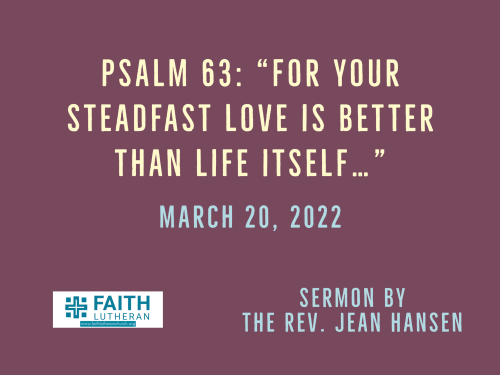
Psalm 63: For your steadfast love is better than life itself…
Mar 20, 2022
Another week … our third with the Psalms. If you also are using the Lent devotional book on the Psalms at home, you may be growing in your appreciation of this book of the Bible. Hopefully, the opposite is not true. The more we read the Psalms, the more it is clear that the Psalms both sing with joy and trust and cry out in pain and doubt; they speak to the highs and lows of the life of faith.
Today’s Psalm is number 63: 1-8, but before we go there, how did this week’s memory verse go for you? As we strive to create for ourselves a library of memorized verses, it is obvious that some are less challenging to remember than others. The verse from last Sunday’s Psalm, #27, was not too difficult. Say it with me if you can: “Wait for the Lord and be strong. Take heart and wait for the Lord.” (Psalm 27:14) Remember, there is a large candy bar just waiting for the first person I approach (not who approaches me) in the Kinship Café who can say it! How about last week’s memory verse? It was more difficult: God says: “I will deliver those who cling to me. I will uphold them because they know my name.” Great!
Now for another piece of background information to add to that which we’ve been gathering about the Psalms. When we look at the Psalms in a Bible, some of them have superscriptions such as “of David” or “of Asaph”. Many scholars say that these superscriptions were added long after the Psalms were written and do not necessarily mean that David or Asaph wrote the Psalm, but that the poem or song is associated with them in some way. In other cases, the superscriptions include terms with unknown meanings – words lost in antiquity. For example, the word “selah” appears 72 times in the Psalms, and we have no idea what it means; it probably is a musical or liturgical notation. (Do you suppose that thousands of years in the future someone will be wondering what our “directions” mean?)
The superscription on Psalm 63 says, “A Psalm of David, when he was in the wilderness of Judah.” That may or may not have been the case; if it was, scholars say it might have been when King David was in the Judean desert as he fled from his son Absalom, who had instigated a revolt against him. But I’m not convinced the Psalm’s tone fits those dire circumstances. So, let’s focus instead on the Psalm’s message.
What we hear today is a deep hunger for God, for all of God. Look at verse 1: “O God, you are my God; eagerly I seek you; my soul thirsts for you, my flesh faints for you, as in a dry and weary land where there is no water.” Or some translations leave out the “as” so that the verse reads, “my flesh faints for you in a dry and weary land where there is no water.”
In the latter, the Psalmist is saying that even though (or because) he is in a desolate place in his life, a place of longing, of being parched, he is focused on God. He is searching for God more than anything else. However, if the “as” is included, then the thirst for God is being compared to the need for water one has after being without it in 100-degree temperatures. In that case, the tone is desperation, in the other it is desire. I’d like to focus on the latter – leave the “as” out - because I think that is what this Psalm is about - desire for God even in difficult circumstances.
How often do any of us feel that way, not desperate for God, but desiring God? As commentator Stan Mast writes: “I love that kind of language, but it is not my language. I mean, I believe in God with all my mind. I trust God with all my heart. I try to obey God in my whole life. I want to love God with heart and soul and mind and strength. But do I desire God? Do I hunger and thirst for God? Do I enjoy the sort of relationship with God that fills me with love and praise and satisfaction?” (1)
In other words, do we desire God with the same kind of intensity as is presented in this Psalm? I’ll admit that on a day-to-day basis, I do not. I’m always fascinated to read about people who do; they often are Saints of ancient days whose behavior seems more than a little odd. So, if this Psalm does not reflect the writer’s desperation, but instead his desire, then where does such emotional language come from?
Commentator Mast suggests that we look at verses 5-6 for a hint. “My spirit is content, as with richest food. When I remember you upon my bed and meditate on you in the night watches.” In a devotional book on the Psalms, Timothy Keller notes that while we all have had sleepless nights, tossing and turning, perhaps with anxiety, that’s not the case for the Psalm writer, who puts sleeplessness to a different use. I’ll quote him: “He sings to God, praising him and thinking about his love, his goodness, and above all, his protection.” (2)
The “night watches” mentioned in the Psalm refer to military changes of the guard, and it seems the Psalmist is awake during all of them. But, instead of allowing his mind to wander, he meditates on God, proclaiming, “My whole being clings to you; your right hand holds me fast.” Another way to describe this is that the Psalmist pays rapt attention to God and thus is filled with desire for God.
I’m sure we all have heard the phrase, “You are what you eat,” and can attest to its truth either because of our own experience or by watching the effect a steady diet of junk food and candy has on a someone else’s health. Well, what about, “You are that on which you focus”? Stan Mast notes that, “if we do not pay attention to God, we won’t desire God, even if we believe in him and trust him and obey him. And, if we don’t desire God, we won’t enjoy God. So, we must intentionally direct our attention to God.” (3)
That is what the Psalm writers have been showing us – how to focus on God, using prayer to express ourselves, with both joy and pain, faith and doubt. Of course, that is only one way to focus on God, there are many others, all of which involve choice on our part.
We want to believe and feel what the Psalmist exclaims in verse 3, “For your steadfast love is better than life; my lips shall give you praise.” Can you imagine? God’s love is better than anything that can be found or experienced in this world.
It’s amazing that in this Psalm there is no attention to the writer’s earthly needs or distress, only desire. Could it be that he knew that in clinging to God, God would uphold him? Words of petition and lament are not required. Come to think of it, I know people who are now in the midst of what some would call a desert, and yet are able to express gratitude to God; it’s a matter of focus.
Thirst for God becomes trust in God. Trust is a gift of the Holy Spirit and grows out of our desire to seek God’s face, even in desolate places, so that we too can proclaim vs. 3, today’s memory verse: “For your steadfast love is better than life itself; my lips shall give you praise.” Please say it with me. “For your steadfast love is better than life itself; my lips shall give you praise.” AMEN
(1) “Commentary on Psalm 63:1-8” by Stan Mast, February 28, 2026, www.cepreaching.org
(2) “The Songs of Jesus” by Timothy Keller, 2015, Penguin Random House, NY, pg. 135
(3) Same as #1






